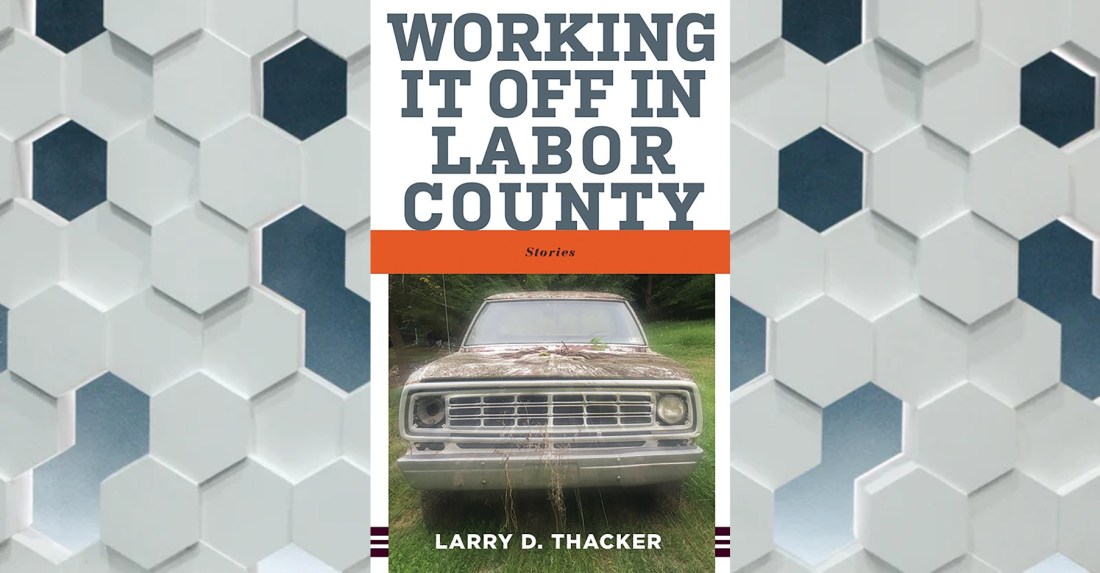A blogger with a “debt-bloated [English] degree” contemplates robbing a bank, capturing firsthand details of daylight thieving for an article that’ll help her pay the rent. An antique collector turns a dog’s mangled corpse into a pickled chupacabra in his “Odditorium.” Such loony happenings would not only turn many a head, but many a page too as Larry D. Thacker’s short story collection Working It Off in Labor County demonstrates.
Taking place in the titular Kentuckian county, where folks judge the time of day by “where [they were] with the day’s pack of smokes,” Working It Off in Labor County chronicles seventeen tales of wayward thinking and derring-do as varied as Uncle Archie’s “collection of preserved body parts of antiquity.” Tales that cast a light on how folks seek solace in a chunk of flyover country that’s in the doldrums and awash with “the many who keep trying to go home, and the too few who know when they’ve arrived.”
As far as homes go, Labor County — with its Appalachian remoteness and dearth of riches besides “the old coal mines burning hundreds of feet underground” — doesn’t seem to convey comfort or security, especially the economic sort, on the surface.
Thacker doesn’t sugarcoat the impoverished reality that casts a pall over Labor Countians, imbuing them with an easy-and-sleazy-buck mentality that makes them hope for outcomes as rich as the creativity in their doings. The story “Day of the Dead Diner, Home of Juan D’s Best BBQ” sees a restaurateur set up shop in a spot haunted by past deaths, engaging in business-boosting blood sacrifices “witnessed by the ancient patron saint of sustenance [Santa Ella].” “The Clown Brothers Eller” features the eponymous duo dressing up as clowns and, from their “wacked-out ice-cream van,” concocting as many Frosto Choco Cones and Vanilla Moose Cones as they do holiday themes around “Earth Day, Memorial Day, D-Day, Fourth of July, [and] 9/11.”
In their quirky labor, the leads also uncover their innermost selves, both the glowing and dirty bits. On one end, some leads do strike it rich — spiritually. In the piece “The Art of Grief,” a father accepts the appropriation of his roadside tribute to his deceased daughter by other Labor County grievers, who turn his memorial into a collective shrine for pouring one’s grief-stricken empathy into a land that feels as if it takes more life than gives it. In “Brotherhood of the Mystic Hand,” a Vietnam vet tosses his “mummified left hand in all its pedestaled and dried-out creepy glory” into a military reunion bonfire, “[hoping] he’d started some cleansing in the head.” Through their characters’ letting go of material comforts that keep them from moving on, such stories highlight the need to embrace change, with fate carving out the path the leads must follow to unearth a wealth of character they can share with others, like trivia-laden littering notices signed “Guardians of the Powelton River.”
On the other end, the characters can also succumb to external pressure and material desires, paying more for their troubles than they earn. In the book’s title piece, a history professor — angry at the Labor County History Society’s confiscation of his Civil War regalia — breaks into Labortown’s museum to retrieve his wares before hitting the road… and then cleaning it for hundreds of community service hours. A doll-loving girl reaches her breaking point from maternal abuse in “Hollow of the Dolls,” nailing her toys “to the nearest roadside telephone pole” to exercise the sense of authority she lacked while dealing with her mother. Via those cautionary tales, Thacker underlines from sundry perspectives the perils of passion clouding judgment, of thinking that the universe should accommodate the individual rather than the other way around.
Because there are so many perspectives in just a handful of short stories, some resolutions are lacking in climactic build-up. From Uncle Archie quickly making amends with and dating the owner of the pre-Chupacabra dog corpse in “Uncle Archie Goes One for Three,” to Benny swiftly accepting to serve as the manager of Angel’s roller-derby team in “Benny and the Hill’s Angels,” these sudden conclusions can seem like the speedy pacing outpowers deep character development, as if to reflect the impatience of Labor Countians in addressing their woes.
But as surprise occurrences like the revival of Levi’s pet canary in “About Levi” suggest, fate works in mysterious ways to present opportunities for new leases on life to Labor County’s well-meaning citizens. Fate also metes out punishment — like thunder strikes that further burden one’s soul with the “pink, bubbly thickness of streaked scars” — to more rigid minds. Rhyme and reason don’t always crop up in Labor County. But in Uncle Archie’s words, “There’s things about the world we don’t know. Things seen. Some unseen. We have to live amongst them all.”
Tender in its depiction of rural American ennui and mordant in its portrayal of colorful go-getters in a patch of coal country, Working It Off in Labor County is as much a collection of droll stories as it is a tale of two realities — the one that folks live in and the other that they dream about and wish to realize against all odds, such as trying to fasten a “toddler-sized miniature saddle” to a 30-pound turkey that looks to have been fed “high-protein puppy treats.” Like George Singleton’s Calloustown and James Joyce’s Dubliners, Thacker’s book may seem restricted because of its locational focus, but it never loses sight of thematic universality thanks to the through line of working it off – “it” being the pressure to dig deep into one’s true self and embrace or resist change in a world of knowns and unknowns.
FICTION
Working It Off in Labor County
By Larry D. Thacker
West Virginia University Press
Published February 1, 2021


